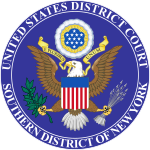
Fax, sometimes called telecopying or telefax, is the telephonic transmission of scanned printed material, normally to a telephone number connected to a printer or other output device. The original document is scanned with a fax machine, which processes the contents as a single fixed graphic image, converting it into a bitmap, and then transmitting it through the telephone system in the form of audio-frequency tones. The receiving fax machine interprets the tones and reconstructs the image, printing a paper copy. Early systems used direct conversions of image darkness to audio tone in a continuous or analog manner. Since the 1980s, most machines transmit an audio-encoded digital representation of the page, using data compression to transmit areas that are all-white or all-black, more quickly.

Megadeth is an American thrash metal band formed in Los Angeles in 1983 by vocalist/guitarist Dave Mustaine. Known for their technically complex guitar work and musicianship, Megadeth is one of the "big four" of American thrash metal along with Metallica, Anthrax, and Slayer, responsible for the genre's development and popularization. Their music features complex arrangements and fast rhythm sections, dual lead guitars, and lyrical themes of war, politics, religion, death, and personal relationships.

David Scott Mustaine is an American musician. He is best known as the co-founder, frontman, primary songwriter and sole consistent member of the thrash metal band Megadeth and for his time as the lead guitarist of Metallica. Mustaine has released sixteen studio albums with Megadeth, sold over 38 million records worldwide, with six albums platinum-certified, and won a Grammy Award for Best Metal Performance in 2017 at the 59th Grammy Awards, for the title track of their fifteenth studio album, Dystopia.
Junk faxes are a form of telemarketing where unsolicited advertisements are sent via fax transmission. Junk faxes are the faxed equivalent of spam or junk mail. Proponents of this advertising medium often use the terms broadcast fax or fax advertising to avoid the negative connotation of the term junk fax. Junk faxes are generally considered to be a nuisance since they waste toner, ink and paper in fax machines.

Carlill v Carbolic Smoke Ball Company[1893] 1 QB 256 is an English contract law decision by the Court of Appeal, which held an advertisement containing certain terms to get a reward constituted a binding unilateral offer that could be accepted by anyone who performed its terms. It is notable for its treatment of contract and of puffery in advertising, for its curious subject matter associated with medical quackery, and how the influential judges developed the law in inventive ways. Carlill is frequently discussed as an introductory contract case, often one of the first cases a law student studies in the law of contract.
A real estate contract is a contract between parties for the purchase and sale, exchange, or other conveyance of real estate. The sale of land is governed by the laws and practices of the jurisdiction in which the land is located. Real estate called leasehold estate is actually a rental of real property such as an apartment, and leases cover such rentals since they typically do not result in recordable deeds. Freehold conveyances of real estate are covered by real estate contracts, including conveying fee simple title, life estates, remainder estates, and freehold easements. Real estate contracts are typically bilateral contracts and should have the legal requirements specified by contract law in general and should also be in writing to be enforceable.
In the law of evidence in the United States, public policy doctrines for the exclusion of relevant evidence encompass several types of evidence that would be relevant to prove facts at issue in a legal proceeding, but which are nonetheless excluded because of public policy concerns. There are five major areas of exclusion that arise out of the Federal Rules of Evidence ("FRE"): subsequent remedial measures, ownership of liability insurance, offers to plead guilty to a crime, offers to settle a claim, and offers to pay medical expenses. Many states have modified versions of the FRE under their own state evidence codes which widen or narrow the public policy exclusions in state courts.

The posting rule is an exception to the general rule of contract law in common law countries that acceptance of an offer takes place when communicated. Under the posting rule, that acceptance takes effect when a letter is posted ; the post office will be the universal service provider, such as the UK's Royal Mail, the Australia Post, or the United States Postal Service. In plain English, the "meeting of the minds" necessary to contract formation occurs at the exact moment word of acceptance is sent via post by the person accepting it, rather than when that acceptance is received by the person who offered the contract.
Internet fax, e-fax, or online fax is the use of the internet and internet protocols to send a fax (facsimile), rather than using a standard telephone connection and a fax machine. A distinguishing feature of Internet fax, compared to other Internet communications such as email, is the ability to exchange fax messages with traditional telephone-based fax machines.

Specht v. Netscape, 306 F.3d 17, is a ruling at the United States Court of Appeals for the Second Circuit regarding the enforceability of clickwrap licenses under contract law. The court held that merely clicking on a download button does not show consent with license terms, if those terms were not conspicuous and if it was not explicit to the consumer that clicking meant agreeing to the license.

The law of contract in Australia is similar to the contract law of other Anglo-American common law jurisdictions, but differences from other jurisdictions have arisen over time because of statute law and divergent development of common law in the High Court, particularly since the 1980s.

Rose & Frank Co v JR Crompton & Bros Ltd [1924] is a leading decision on English contract law, regarding the intention to create legal relations in commercial arrangements. In the Court of Appeal, Atkin LJ delivered an important dissenting judgment which was upheld by the House of Lords.
Browsewrap is a term used in Internet law to refer to a contract or license agreement covering access to or use of materials on a web site or downloadable product. In a browse-wrap agreement, the terms and conditions of use for a website or other downloadable product are posted on the website, typically as a hyperlink at the bottom of the screen. Unlike a clickwrap agreement, where the user must manifest assent to the terms and conditions by clicking on an "I agree" box, a browse-wrap agreement does not require this type of express manifestation of assent. Rather, a web-site user purportedly gives their consent simply by using the product — such as by entering the website or downloading software.

A contract is an agreement that specifies certain legally enforceable rights and obligations pertaining to two or more parties. A contract typically involves consent to transfer of goods, services, money, or promise to transfer any of those at a future date. The activities and intentions of the parties entering into a contract may be referred to as contracting. In the event of a breach of contract, the injured party may seek judicial remedies such as damages or equitable remedies such as specific performance or rescission. A binding agreement between actors in international law is known as a treaty.
Stevenson, Jaques, & Co v McLean [1880] 5 QBD 346 is an English contract law case concerning the rules on communication of acceptance by telegraph. Its approach contrasts to the postal rule.

Lefkowitz v. Great Minneapolis Surplus Store, Inc 86 NW 2d 689 is an American contract law case. It concerns the distinction between an offer and an invitation to treat. The case held that a clear, definite, explicit and non-negotiable advertisement constitutes an offer, acceptance of which creates a binding contract. Furthermore, it held that an advertisement which did not clarify the terms of its bargains, such as with fine print, could not then be modified with arbitrary house rules.

Contract law regulates the obligations established by agreement, whether express or implied, between private parties in the United States. The law of contracts varies from state to state; there is nationwide federal contract law in certain areas, such as contracts entered into pursuant to Federal Reclamation Law.

Holwell Securities Ltd v Hughes [1974] 1 WLR 155 is an English contract law case overriding the usual postal rule.
Contract law in Saudi Arabia is governed by the conservative Hanbali school of Sharia law, which adopts a fundamentalist and literal interpretation of the Quran. Any contract that is not specifically prohibited under Sharia law is legally binding, with no discrimination against foreigners or non-Muslims.

Power of acceptance is a concept of contract law. It refers to the power vested in the offeree by the offeror through the offer being made. It is used to determine whether the acceptance of an offer is valid.








